
Limits and Potentials of the Developing Countries in Global Governance
Inclusive global governance is one of the on-going efforts of the developing countries in this fast changing and complicated world. This is a process that started in the 1960s and will continue for many years to come.
I. Current Roles of the Developing Countries in Global Governance. Among all the roles, the following three stand out prominently. (1) They are the promoters of the UN centrality and democratization of international relations. Actually they are evolutionary reformers of the existent mechanisms. (2) They are invigorators of new mechanisms to cope with new challenges of our times, both institutionally and conceptually. A case in point is their role of G-20 by pursuing consultation and cooperation with the developed countries during the ongoing financial crisis and economic difficulties. (3) They are initiators of mechanisms of developing/emerging powers, such as the BRICS. The forming of BRICS reflects the shifting distribution of powers and upgrading of the developing countries.
Continue reading “Jiemian YANG: Global Governance Limits and Potentials”





